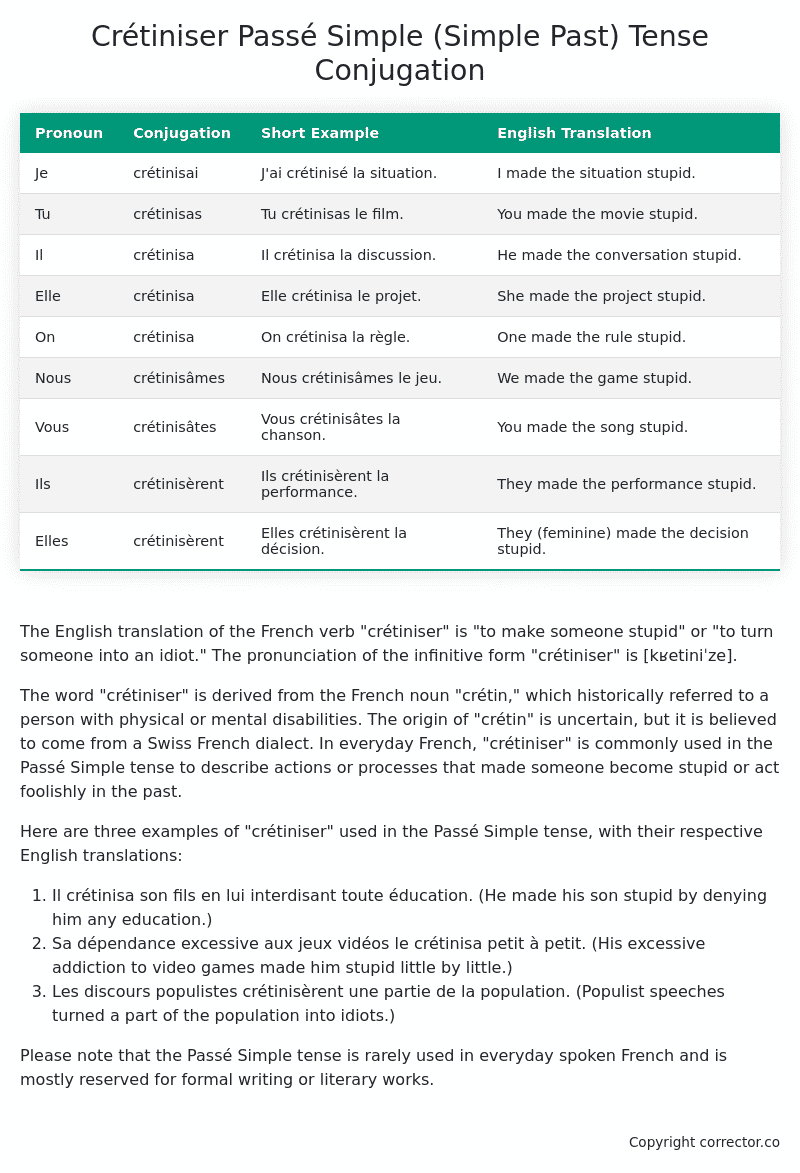Passé Simple (Simple Past) Tense Conjugation of the French Verb crétiniser
Introduction to the verb crétiniser
The English translation of the French verb “crétiniser” is “to make someone stupid” or “to turn someone into an idiot.” The pronunciation of the infinitive form “crétiniser” is [kʁetiniˈze].
The word “crétiniser” is derived from the French noun “crétin,” which historically referred to a person with physical or mental disabilities. The origin of “crétin” is uncertain, but it is believed to come from a Swiss French dialect. In everyday French, “crétiniser” is commonly used in the Passé Simple tense to describe actions or processes that made someone become stupid or act foolishly in the past.
Here are three examples of “crétiniser” used in the Passé Simple tense, with their respective English translations:
- Il crétinisa son fils en lui interdisant toute éducation. (He made his son stupid by denying him any education.)
- Sa dépendance excessive aux jeux vidéos le crétinisa petit à petit. (His excessive addiction to video games made him stupid little by little.)
- Les discours populistes crétinisèrent une partie de la population. (Populist speeches turned a part of the population into idiots.)
Please note that the Passé Simple tense is rarely used in everyday spoken French and is mostly reserved for formal writing or literary works.
Table of the Passé Simple (Simple Past) Tense Conjugation of crétiniser
| Pronoun | Conjugation | Short Example | English Translation |
|---|---|---|---|
| Je | crétinisai | J’ai crétinisé la situation. | I made the situation stupid. |
| Tu | crétinisas | Tu crétinisas le film. | You made the movie stupid. |
| Il | crétinisa | Il crétinisa la discussion. | He made the conversation stupid. |
| Elle | crétinisa | Elle crétinisa le projet. | She made the project stupid. |
| On | crétinisa | On crétinisa la règle. | One made the rule stupid. |
| Nous | crétinisâmes | Nous crétinisâmes le jeu. | We made the game stupid. |
| Vous | crétinisâtes | Vous crétinisâtes la chanson. | You made the song stupid. |
| Ils | crétinisèrent | Ils crétinisèrent la performance. | They made the performance stupid. |
| Elles | crétinisèrent | Elles crétinisèrent la décision. | They (feminine) made the decision stupid. |
Other Conjugations for Crétiniser.
Le Present (Present Tense) Conjugation of the French Verb crétiniser
Imparfait (Imperfect) Tense Conjugation of the French Verb crétiniser
Passé Simple (Simple Past) Tense Conjugation of the French Verb crétiniser (You’re reading it right now!)
Passé Composé (Present Perfect) Tense Conjugation of the French Verb crétiniser
Futur Simple (Simple Future) Tense Conjugation of the French Verb crétiniser
Futur Proche (Near Future) Tense Conjugation of the French Verb crétiniser
Plus-que-parfait (Pluperfect) Tense Conjugation of the French Verb crétiniser
Passé Antérieur (Past Anterior) Tense Conjugation of the French Verb crétiniser
Futur Antérieur (Future Anterior) Tense Conjugation of the French Verb crétiniser
Subjonctif Présent (Subjunctive Present) Tense Conjugation of the French Verb crétiniser
Subjonctif Passé (Subjunctive Past) Tense Conjugation of the French Verb crétiniser
Subjonctif Imparfait (Subjunctive Imperfect) Tense Conjugation of the French Verb crétiniser
Subjonctif Plus-que-parfait (Subjunctive Pluperfect) Tense Conjugation of the French Verb crétiniser
Conditionnel Présent (Conditional Present) Tense Conjugation of the French Verb crétiniser
Conditionnel Passé (Conditional Past) Tense Conjugation of the French Verb crétiniser
Conditionnel Passé II (Conditional Past II) Tense Conjugation of the French Verb crétiniser
L’impératif Présent (Imperative Present) Tense Conjugation of the French Verb crétiniser
L’impératif Passé (Imperative Past) Tense Conjugation of the French Verb crétiniser
L’infinitif Présent (Infinitive Present) Tense Conjugation of the French Verb crétiniser
L’infinitif Passé (Infinitive Past) Tense Conjugation of the French Verb crétiniser
Le Participe Présent (Present Participle) Tense Conjugation of the French Verb crétiniser
Le Participe Passé (Past Participle) Tense Conjugation of the French Verb crétiniser
Struggling with French verbs or the language in general? Why not use our free French Grammar Checker – no registration required!
Get a FREE Download Study Sheet of this Conjugation 🔥
Simply right click the image below, click “save image” and get your free reference for the crétiniser Passé Simple tense conjugation!

Crétiniser – About the French Passé Simple (Simple Past) Tense
Formation
Usage
Narration
Historical Context
Interactions with other tenses
Passé Composé
Imparfait
Conditional and Subjunctive
Summary
I hope you enjoyed this article on the verb crétiniser. Still in a learning mood? Check out another TOTALLY random French verb conjugation!


